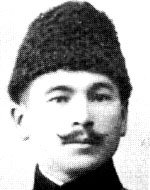Son of Bilha and Aharon. He was born on December 25, 1891, in Nes Ziona with the first vineyard of his family and hence his name. He studied at the elementary school in Rehovot and after completing his studies in Jerusalem he went to the “Ezra” school. At the same time he took many trips on foot in the Judean Desert, watching every rock, plant and ruin. When the Young Turks came to power, they published a new constitution and for the first time even non-Muslims were allowed to join the Turkish army. son of-Karmi wanted to prove to the Muslims that the Jews did not fall from them. He went to Constantinople, where he was accepted to the officers’ school of the Turkish army, and when they finished he became the first Jewish officer in the Turkish army. He participated in the Balkan wars in the battles of Tastelja, Didiagec, and Kyrkisilia, and even though many fell around him on the battlefield and starvation and cold, he did not abandon the battle as many of his comrades in arms did. He wrote to his parents at the time: “I will not run away, I will give my word and keep it, I will not desecrate the name of Israel, and the honor of the land of Israel is more precious to me than all.” He was promoted to the rank of lieutenant (mulazem) and received the title of “Gazi” – the victor – during his excellence in combat. After the end of the Balkan War in 1913 he returned to Israel on vacation and during this time traveled a lot and inquired about everything happening in the country but was called telegraph to return to Constantinople. When the First World War broke out, son of-Carmi was sent to the Russian front and from there he wrote, among other things, “My only consolation is that I will avenge the tyranny of our people. He was promoted to the rank of “sergeant colonel,” was wounded in the battle, was hospitalized for several months, and after his recovery he embarked on a campaign in the Caucasus front again. Where he was wounded and taken prisoner by the Russians. After recovering from his wounds, the Russians returned his sword as a gesture of honor and appointed him to be in charge of the captured officers. In captivity he wandered from one prison camp to another for four years. He stayed in the Caucasus, Crimea, Turkestan, Voronezh, and finally Siberia on the border with China. In his captivity, he stood out for leadership skills, served as a spokesman for the Turkish and Arab prisoners, and comforted and encouraged the Jewish prisoners for whom he taught Hebrew and Jewish history. During his stay in Siberia he also worked among the Jews of this region in the direction of their immigration to Eretz Israel. In a letter to his parents after the end of the war, Ludwig Yokel, an Austrian Jewish officer who was a friend of Shabi son of-Carmi, wrote to son of-Carmi: “… I found here my personality, my Jewish bones, His hand began to rise from the swamp of assimilation, from the spiritual exile that is more painful than the physical exile, a difficult and multi-obstacle climb, but full of splendor and beauty. At the beginning of 1940, the Jewish prisoners, soldiers and officers from Austria and Hungary, held a Chanukah party in Vladivostok, where they decided to establish a new colony in the Land of Israel between the mountains of Moav, which would guard the borders of the country. On the 18th of Tevet 5702 (January 19, 1920), he left his parents and brothers, and after his death his friend wrote to his family: “On January 11 the funeral was attended by a large number of prisoners and citizens of Nikolsk “His Turkish friends also shared the last honor of his deceased son, one of whom gave a speech on his grave The Jewish Agency was officially recognized by the local Zionist Organization, and the money was collected in order to register the name of the deceased in the Golden Book of the Jewish National Fund. I can not refrain from saying in this place a few words about the great influence that the deceased had on the prisoners. They all loved him because a Jew from Eretz Israel was one of the new generation that was educated in the Land of the Patriarchs … From his mouth we learned our language, the language of our people, which was unknown to us … I sat with him for about four years. A friend and a teacher were in our home, and his family tried to bring his remains to Eretz Israel, but he was not able to do so.In his investigation of the year 2017, he found his place of rest in the Nichols-Osorisk camp in Russia.
